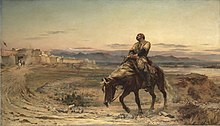Battle of Gandamak

Last Stand at Gundamuck by William Barnes Wollen. Heroic depiction of the defeat of the British troops at Gandamak
| date | January 13, 1842 |
|---|---|
| place | near Gandamak , Afghanistan |
| output | Victory of the Afghans |
| Parties to the conflict | |
|---|---|
| Commander | |
| Troop strength | |
| 65 men | |
The Battle of Gandamak was a military conflict on January 13, 1842 between British troops and Afghans during the First Anglo-Afghan War .
In December 1838 the British-Indian Army of the Indus invaded Afghanistan. On July 30, 1839, she reached Kabul and took the city on August 7 without a fight. After a revolt of the Afghan population broke out in Kabul in November 1841, the garrison surrendered and withdrew under General William George Keith Elphinstone on January 6, 1842. The destination was the British base of Jalalabad , about 140 kilometers away, with the assurance of free withdrawal and an Afghan escort. During the retreat she was persecuted by the Afghans under Akbar Khan . The promised Afghan escort, which was supposed to protect the British from precisely such acts of revenge, did not appear. The British were visibly decimated and dispersed until a final skirmish with the remaining 65 soldiers, including 20 officers, of the 44th East Essex Regiment on January 13 near Gandamak , 35 miles from Jalalabad . The Afghans first tried to persuade the British to give up and then began the attack. The British were defeated and only six mounted officers escaped.
In the end, the only survivor was the military doctor William Brydon , who reached the besieged Jalalabad on the afternoon of January 13, 1842 .
Literary processing
Theodor Fontane wrote the poem Das Trauerspiel von Afghanistan in 1859, which is about the withdrawal of Elphinstone.
literature
- Archibald Forbes: Britain in Afghanistan. Volume 1: The First Afghan War 1839-42 (= Regiments & Campaigns. Vol. 20). Leonaur, Milton Keynes 2007, ISBN 978-1-84677-304-4 .
- Patrick Macrory: Retreat from Kabul. The catastrophic British Defeat in Afghanistan, 1842. Lyons Press, Guilford CT 2002, ISBN 1-59921-177-7 .
